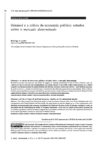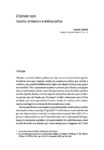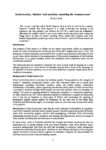International Gramsci Society Archive
The IGS Archive is a platform for members of the International Gramsci Society to share their research papers and publications, via free access, facilitating the exchange of ideas and information across the globe.
Gramsci e o conceito de crise orgânica
O presente trabalho divide-se em três seções: a primeira traz um panorama histórico do entreguerras (1918-1939), a segunda apresenta o conceito de crise orgânica a partir das notas dos Cadernos do cárcere e a última consiste nas considerações finais, em que se faz um breve balanço das principais ideias abordadas ao longo do trabalho. O objetivo central do artigo consiste não somente em fazer uma exegese da obra de Gramsci em torno do conceito de crise orgânica, mas também procurar as principais determinações lógico-históricas do referido conceito para ajudar no entendimento, com as devidas mediações conjunturais, da atual crise capitalista.
Gramsci and the critque of political economy: studies of determined market
This article analyzes the determined market in work by Antonio Gramsci, both in the Prison Notebooks and in his correspondence with Tatiana Schucht and Piero Sraffa. The study points out that this category is one of the central points of the dialectical unity among philosophy, economy, and politics in the Prison Notebooks (the three sources of Marxism, according to Lenin), an unavoidable unit for understanding the totality of Gramscian elaborations. In this unit, the critique of the political economy has considerable significance, which is not always recognized by commentators on Gramsci’s work. One of the objectives of this article is to reassess the significance of studies on political economy in Gramsci’s theory.
Gramsci, Poulantzas e a transição socialista
This article defends the hypothesis that the strategic moment in the class struggle to construct an alternative hegemony is when a hegemonic apparatus is created outside of the functional structures and institutions of the capitalist state. Therefore, it is necessary to consider the potential for the expansion of the political practices of the working classes beyond the limits of bourgeois institutions. It is by debating between the Gramscian perspective of the concepts of hegemony and ideology, on the one hand, and the reading of those same ideas by structural Marxism, on the other, that we expect to find the appropriate theoretical framework for the approach suggested here.
Revolução passiva e jacobinismo: uma bifurcação da história
O objetivo deste texto é demonstrar como Antonio Gramsci desenvolve as possibilidades de construção de um novo bloco historico pelas vias jacobina e da revolucão passiva. Por meio da crítica ao antijacobinismo do filósofo francês Georges Sorel, Gramsci elabora teoricamente a possibilidade de uma via jacobina para a construção do novo bloco histórico. Tomada como alternativa revolucionária ao processo necessariamente conservador representado pelas revoluções passivas, a via jacobina “gramsciana” se constituiria pela inserção das massas à vida estatal promovida pelo partido enquanto moderno príncipe maquiaveliano.
Social classes and subaltern groups: Theoretical distinction and political application
The purpose of this article is to draw a theoretical distinction between the notions of ‘social classes’ and ‘subaltern groups’ as defined in The Prison Notebooks by Antonio Gramsci. This distinction will involve a brief discussion about the notions of ‘social classes’ evolved by other key authors in the area, apart from Gramsci himself, such as Marx, D. Bensaïd, E. P. Thompson and N. Poulantzas, who, on this question, have close affinities with the ideas of Gramsci. Finally, I seek to make suggestions about how this distinction can be applied, together with some critical observations on ‘Subaltern Studies’ and some final considerations with regard to this article as a whole.
Il biennio nero Fascismo, antifascismo e violência política
Il biennio nero: fascism, antifascism and political violence Shortly after the workers’ experience of the so-called Biennio Rosso struggles in Italy between 1919 and 1920, several armed organizations of ex-combatants of the Great War and workers emerged, with the aim of resisting the violent incursions of fascist squads against popular sectors both in the city and in the countryside. The Biennio nero (1921-1922), which would mark the fascist rise to the March on Rome and the coming to power of Benito Mussolini, would nevertheless experience some episodes of popular victory in arms against fascism in an atmosphere of civil war. The main organization of this armed worker resistance by the Italian territory were the Arditi del popolo. The article intends to follow this period succinctly, with the help of recent Italian historiography, to contextualize and present Gramsci’s analysis of such historical experience, both in his texts published at the time in L’Ordine Nuovo and later in his reflections prisons. The hypothesis is that although he has deepened his theoretical analysis of political-military class relations, Gramsci never changed his mind about the need for subaltern groups to organize “illegal” forms of resistance, outside the current institutional framework, as a part of the struggle of hegemonies.
Social security, ‘shirkers’ and sanctions: unsettling the ‘common sense’
Drawing on the ideas of Antonio Gramsci, especially ‘common sense’ and’ war of position’, this paper examines the the interventions of a community trade union in the struggle against state benefit or social security sanctions in the UK. It also considers how alliances might be built in a reinvigorated campaign to challenge the prevailing common sense that underpins the sanctions regime.
Authoritarianism, education and the limits of political socialisation in Egypt
President al-Sisi has declared 2019 to be the ‘Year of Education’ whereby a National Project is to be launched to reform the education system. These proposed reforms are crucial, yet the politics driving them and their implications for al-Sisi’s regime remains unclear. Discussions surrounding how education is political and can help protect authoritarian regimes have largely been understated in the existing literature. This paper’s objective is to encourage a critical outlook through utilising a Gramscian approach that considers education to be a politically contested domain. This approach views education as a hegemonic apparatus capable of developing consent through politically socialising the populace into accepting certain knowledge, attitudes, and behaviours conducive to the regimes in power. By analysing the education system under Nasser, Sadat, and Mubarak, I illustrate the extent to which education has been politicised through its attempts to serve and legitimise their regimes and objectives; and outline the challenges that hindered their abilities to protect their hegemony and assume complete control over education. Questioning the political, economic, and socio-cultural basis on which the Egyptian education system is premised can enable us to avoid reproducing its existing problems, and importantly, reconsider the relationship between politics and education under al-Sisi’s Egypt.
Education as Resistance: Egyptian Civil Society and Rethinking Political Education Under Authoritarian Contexts
This paper explores political education in Civil Society Organisations (CSOs) in post-uprisings Egypt. By employing the work of Peter Mayo and Adam Morton, I develop a Gramscian framework that argues for the need to rethink political education where it can take direct and indirect forms. Direct political education explicitly teaches about politics and rights, and is more likely to be repressed by the Egyptian state. Whereas indirect political education is more covert taking the forms of games and simulations which can appear, in hindsight, to be apolitical but could have numerous contradictory political implications. Through analysing the different forms of political education provided in Egyptian civil society, I seek to understand how CSOs are able to adapt their educational methods to function, survive and educate under authoritarian contexts. This way, the paper offers an insight into the interplay between authoritarianism and resistance through the medium of education.
Rethinking resistance under authoritarianism: civil society and non-contentious forms of contestation in post-uprisings Egypt
In 2018 President Abdel Fattah al-Sisi secured a second presidential term in a constrained political environment exacerbated by his control over the media, prosecution of journalists and activists, and his crackdown on civil society. As a result of such resilient authoritarianism, the optimism that once defined the Egyptian uprisings has turned into cynicism. This paper contributes to the literature surrounding civil society and resistance in authoritarian contexts by offering an examination of the interplay between authoritarian tendencies and their resistance in post-uprisings Egypt. I argue that we should view al-Sisi’s regime as representing an authoritarian system that is not absolute, despite its soft and hard repressive methods, but one that still offers limited space for civil society organizations (CSOs) to function. This limited space importantly comprises covert resistance methods which can offer Egyptian CSOs opportunities to resist the state’s legal and extra-legal restrictions. The resistance methods considered in this paper need to be understood in Gramscian terms as they encompass the limited means available by which CSOs can negotiate the terrain of hegemonic contestation under the existing authoritarian context. Given al-Sisi’s re-election and the sustained crackdown on Egyptian civil society, the need to analyse such forms of resistance is pertinent.










